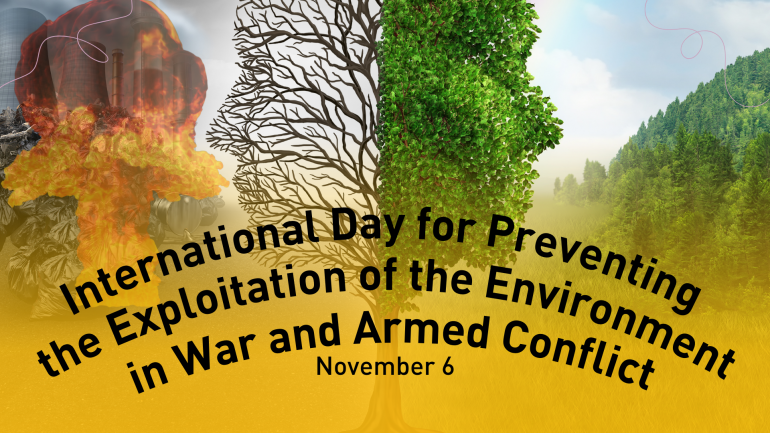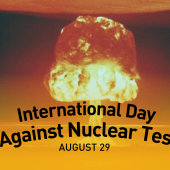International Day for Preventing the Exploitation of the Environment in War and Armed Conflict

Every year on November 6, the UN observes the International Day for Preventing the Exploitation of the Environment in War and Armed Conflict. The day seeks to make people aware of the consequences that war and conflict have on the environment, besides on people.
On that day, we recognize the environment as yet another victim of war. Crops are torched, water wells polluted, and soils poisoned to gain short-term military advantages, with devastating consequences that can last decades.
Though humanity has always counted its war casualties in terms of dead and wounded soldiers and civilians, destroyed cities and livelihoods, the environment has often remained the unpublicized victim of war.
Water in wells has been polluted; crops torched; forests cut down, soils poisoned, and animals killed to gain military advantage.
Furthermore, the United Nations Environment Programme (UNEP) has found that over the last 60 years, at least 40 percent of all internal conflicts have been linked to the exploitation of natural resources, whether high-value resources such as timber, diamonds, gold and oil, or scarce resources such as fertile land and water.
Conflicts involving natural resources have also been found to be twice as likely to relapse.
Loss of life and the destruction of property are obvious consequences of war and armed conflict. There is another consequence as well. This is the negative effect that war and conflict have on the environment.
Some of these negative effects include:
- Water pollution
- Torched crops
- Poisoned soil
- Dead animals
- Destruction of forests
The United Nations attaches great importance to ensuring that action on the environment is part of conflict prevention, peacekeeping, and peacebuilding strategies because there can be no durable peace if the natural resources that sustain livelihoods and ecosystems are destroyed.
On November 5, 2001, the UN General Assembly declared November 6 of each year as the International Day for Preventing the Exploitation of the Environment in War and Armed Conflict (A/RES/56/4).
Later, on May 27, 2016, the United Nations Environment Assembly adopted resolution UNEP/EA.2/Res.15, which recognized the role of healthy ecosystems and sustainably managed resources in reducing the risk of armed conflict and reaffirmed its strong commitment to the full implementation of the Sustainable Development Goals listed in General Assembly resolution 70/1, entitled "Transforming our world: the 2030 Agenda for Sustainable Development".
How will we observe this day? Government officials, scientists, and educators around the world observe this day.
Maybe we can arrange different levels of group discussions to better understand the negative effects of war on the environment.
Then solutions are proposed to protect the earth’s ecosystem in light of conflict. Radio talks, lectures, seminars, and classroom activities also focus on how war affects the environment.
On this International Day, we stress the critical importance of protecting the environment in times of armed conflict and restoring the good governance of natural resources during post-conflict reconstruction.
We also recognize the important role that natural resources play in supporting the livelihoods and resilience of all members of society, especially women, and the implications of sustainable natural resource management for conflict prevention and peace.
Let us work together to protect the environment before, during, and after armed conflict and to save the world.
Radio Veritas Asia (RVA), a media platform of the Catholic Church, aims to share Christ. RVA started in 1969 as a continental Catholic radio station to serve Asian countries in their respective local language, thus earning the tag “the Voice of Asian Christianity.” Responding to the emerging context, RVA embraced media platforms to connect with the global Asian audience via its 21 language websites and various social media platforms.














